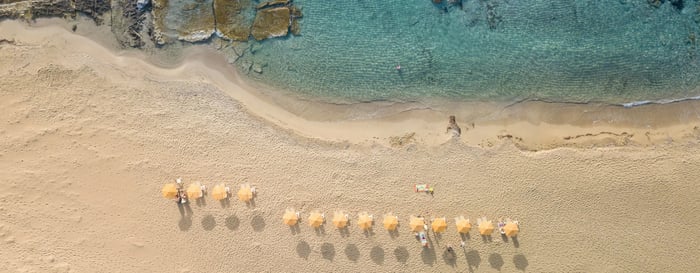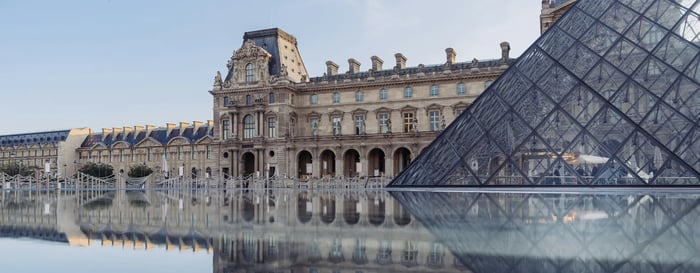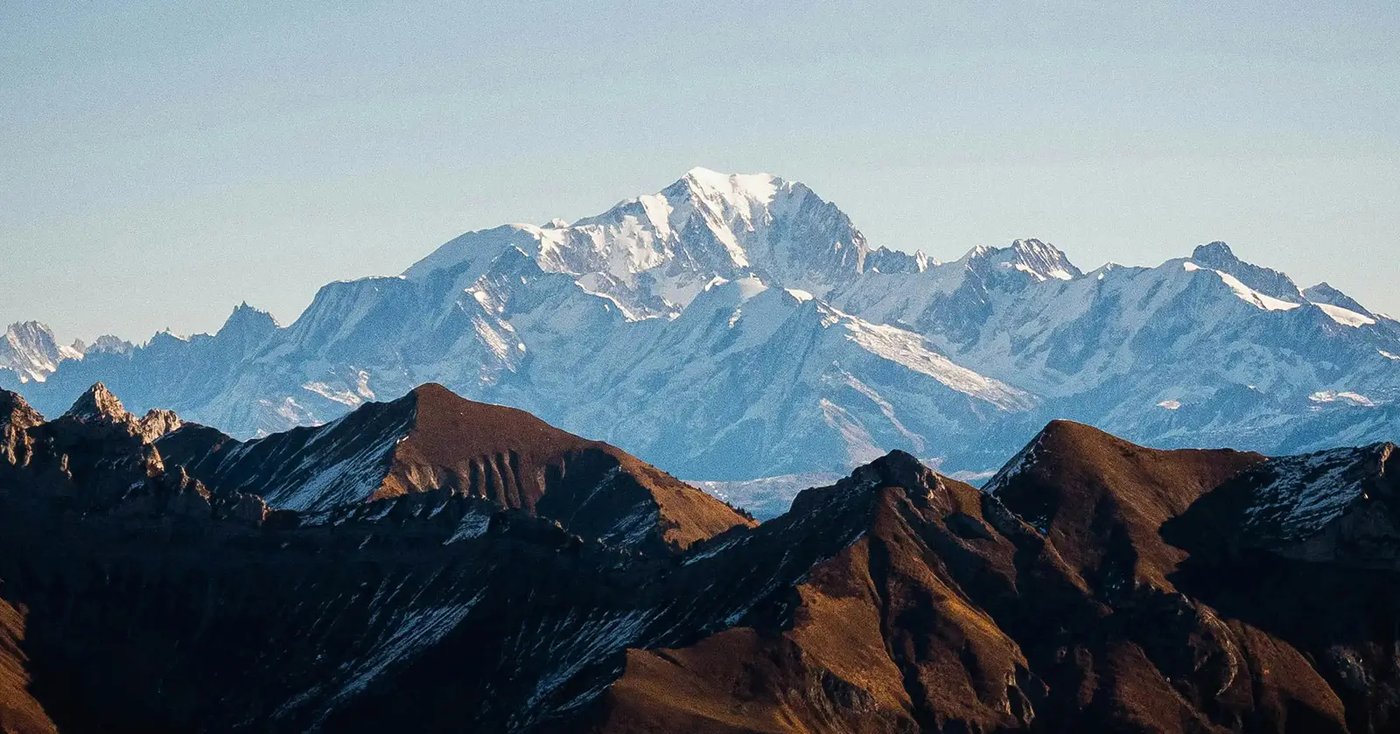Woodsmoke twined around sleeping camels as dawn bleached the stars above my campsite. The morning air tasted cool and dry. To my left, I saw the lacy track of a darkling beetle who’d skittered past my face while I slept. I’d spent the night alert to the chirps and rustles of the nocturnal desert, drifting into sleep only when the crescent moon dipped past the sandy horizon.
It was the first camp of a 12-day trek on Egypt’s Sinai Trail, a 220-kilometer walk from the Red Sea to the summit of Mount Sinai. The entire route is 550 kilometers long, a triangular circuit that takes nearly two months to complete and crosses the territories of eight Bedouin tribes, from the high-mountain Jebeleya to Hamada living in far-flung valleys. There’s no path scratched into the rock, or cairns marking the sandy washes. Instead, my group of 17 hikers walked alongside guides who count knowledge of their land’s bare curves, hidden wells, and history as a precious inheritance. Long-lashed camels carried our bags, and we slept each night under a slow-turning net of stars.

My body craved more sleep, still tired from the previous day’s hike up a steep gully. But as I stretched inside the puffy cocoon of my sleeping bag, the scent of fresh bread begin to mingle with the smoke. Finally, the aroma sent me groping for my sandals and I joined the Tarabin and Muzeina guides who were hunched around the fire, sipping at glasses of sweet tea and cardamom coffee. A puffy round of dough peeked out of the coals, a flat loaf baking under hot embers. Slapping ash from the sturdy crust, Tarabin guide Musallem Abu Faraj broke a palm-sized hunk from the bread and set it before me. The bread smelled lightly of smoke and ashes, with a tender crumb that wafted steam. It was my first taste of Bedouin bread, but it would not be my last.
As I’d learn over the coming days, baking bread punctuates the hypnotic rhythm of desert travel, a ritual for both the pre-dawn hours and the powerful heat of midday. “I learned to make bread from my father,” said Youssef Barakat, an Alegat tribesman from the Sinai Peninsula’s Serabit el-Khadim, “and he learned from his father.” That it’s a tradition passed from father to son marks the desert as a place apart, because at home, baking bread is often considered women’s work. Out here it’s male hands, their palms hardened by camel harnesses and desert stones, that shape dough into tender sheets. Galabiya-clad bakers scrape and fuss over the coals, leaning through the smoke as they test for doneness and break the loaves into meal-sized pieces.
The oldest, most experienced guides bake alongside the young Bedouin men who have come along to learn the skills of desert travel. “When the Bedouin travel together, they open these intergenerational channels of communication,” said Ben Hoffler, a co-founder of the Sinai Trail. “How to read the stars, the legends of the stars, the names of the places, the ways of water sources—traveling makes that knowledge relevant and necessary.” They are skills that are easily lost. Life has changed in the Sinai Desert in the span of a few generations, a time which has seen international warfare, terrorist attacks, and a growing influx of foreigners to beach resorts in Sharm el Sheikh and Dahab. Those transformations put traditions at risk, but many Bedouins I met in the desert hoped that forging the trail, which was founded in 2015, would be an opportunity for preservation. “It’s very important for me to keep the old Bedouin ways,” Youssef Barakat said. “When children don’t travel and don’t work with camels, they lose that.”

Those old Bedouin ways set the pace for our days in the desert. Waking before dawn, we shared coffee around the fire as the guides traced maps of the day’s route into the sandy ground, sketching a complex topography from memory. At noon, we sought shady places to talk and nap through the hottest hours, lying side-by-side beneath thorn trees or rocky overhangs. Often, a fire was kindled using shards of wood scavenged from the sand. We sipped sweet tea, and someone stirred together a simple bread dough made from flour, water, and salt.
We ate two kinds of bread: The hot loaf I tried at the first night’s campsite was the puffy libba, a round that’s baked directly in the coals. Thinner and more delicate, fatir is slapped onto hot metal then peeled off in blistered sheets. Those breads became the centerpiece of our mealtimes, when we gathered around broad platters set on the ground. Conversation quieted as we used our fingers to scoop fire-roasted eggplants and salty cheese onto pieces of the fresh-baked loaves.
By sharing food from a communal dish, we experienced a tradition that’s at the heart of Bedouin life. In Arabian Sands, a 1959 account of exploring the Arabian Peninsula’s Empty Quarter, Wilfred Thesiger recalled legends of Bedouins who’d spent their fortunes on feasts, feeding strangers and kin alike. Ruined financially, their stories were told again and again as aspirational object lessons in generosity. And as he crossed shifting dunes and rocky plains, the author visited the camps of travelers eager to share what little they had. “I protested, saying 'Enough! Enough!',” Thesiger wrote, but at each meeting his hosts waved away his concern. “When I left them they had almost convinced me that I had done them a kindness by staying with them.”
Shaped by a punishing landscape, the desert culture still venerates a graciousness equal to the challenges of life in the wilderness—and the belief that sharing food cements friendships between fellow travelers. “There’s a language of hospitality in the desert, and bread is really at the heart of it,” Hoffler told me. “The Bedouins say that when you have eaten bread with somebody, he will not be your enemy.”

Beach, Food, & Art Summer Holiday
Greece Cyclades: Mykonos & Santorini Barcelona Madrid Spain Europe
- Explore Athens on a private guided tour, including a trip to the Acropolis
- Visit the sacred site of Delphi, home of the oracle of Apollo
- Enjoy beautiful beaches and fun activities in Mykonos
- Get a taste of Spain on a tapas tour of the Spanish capital, Madrid
- Discover the world of Gaudi in the avant-garde city of Barcelona
Gourmet Tour of Bordeaux and Paris
- Visit Saint-Julien to learn how to taste fines wines
- Tour Bordeaux to sample the finest wines in various appellations
- Experience the subterranean church and cemetery at Saint-Emilion
- Sample cognac and learn how to pair it with food in the Cognac region
- Enjoy a private cruise on the River Seine followed by dinner at a renowned Parisian restaurant








